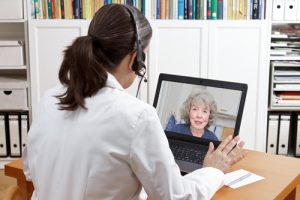
Internet connectivity and telehealth services are critical for Americans living in rural areas, said U.S. Rep. Bob Latta (R-OH) on Jan. 23 when he hosted Federal Communications Commission (FCC) Chairman Ajit Pai at Mercy Health in Perrysburg, Ohio.
“Connected care services increase access to care for people in rural and low-income areas and we know telehealth can lead to better health outcomes and significant cost savings for both patients and health care providers,” Rep. Latta said. “Increasing access to reliable and affordable broadband will allow us to better capture all of its benefits and ensure more people have access to the care and services they need.”
“It was a pleasure to join Congressman Bob Latta in Ohio to hear how connectivity enables physicians to assess and treat stroke patients much more quickly than before,” said Pai.
The FCC is collecting public comment on its July 2019 notice of proposed rulemaking, which would establish a three-year, $100 million Connected Care Pilot program to bring telehealth services directly to low-income patients and U.S. military veterans, according to Rep. Latta’s statement.
The program would provide an 85 percent discount on connectivity from broadband-enabled telehealth services that connect patients directly to their doctors, the statement says.
“Connected health has the power to transform the lives of patients across the country,” said Pai. “I’m committed to continuing my work at the FCC to harness the power of technology to improve the health of all Americans.”
Rep. Latta and Pai also visited Rescue Mental Health and Addiction Services, a national suicide prevention lifeline crisis center in Toledo to tour the facility and discuss the benefits of designating 9-8-8 as the national suicide hotline number.
“We can also do more to ensure people can better access mental health services no matter where they call home,” said Rep. Latta. “Sadly, the suicide rates in each state are rising and Ohio is no exception,” where he said “calls to the suicide lifeline have increased 67 percent from 2016 to 2019.”
“The need for suicide prevention services has never been greater and I appreciate the attention the FCC has placed to designate 9-8-8 as the national suicide hotline number,” the congressman said. “Ultimately, 9-8-8 will bring us one step closer to reducing the stigma surrounding mental health conditions, increasing access to crisis services for those at risk of suicide no matter where they live, and most importantly, save more lives across the country.”



